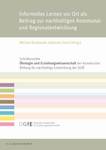Informal learning on the ground - with networking beyond Rio plus 20
In: Informal Local Learning as a Contribution to Sustainable Local and Regional Development.
Abstract
Informal learning processes are becoming increasingly important in the context of education for sustainable development - not least in the context of sustainable municipal and regional development. With the help of application-oriented examples, the authors analyse various aspects of such learning processes from a transdisciplinary perspective: How do networks organise themselves at a municipal or regional level? How are formal, non-formal and informal learning processes linked? How can the various stakeholders be integrated? And how can communal-informal learning be method(ologically) described and implemented? The question of how self-organised and externally organised networks can crystallise in local and regional areas and at the same time take up global (ESD) perspectives is now coming to the fore. At the same time, there is an interest in how, for example, formal, non-formal and informal learning processes can be linked in the context of ESD in municipal contexts without destroying the special characteristics of informal learning. In addition, synergy effects from such networks for municipal and regional development are coming into focus. The participation of learners (keyword: involvement of civil society actors and co-determined learning/participation) is receiving special attention. Against this background, most of the contributions are also dedicated to method(olog)ical questions of communal-informal learning, in relation to learning as such, but also to the management of ESD learning processes as examples of (good) governance processes. Finally, a nature-aesthetic-informal learning, focussed on an educational theory and action-oriented ESD, is traced in the municipality or region. (Publisher)
Authors
Göll, EdgarFields of research

Source information
Title
Informal learning on the ground - with networking beyond Rio plus 20
"Ecology and Educational Science" of the Commission on Education for Sustainable Development of the German Society for Educational Science
Informal local learning as a contribution to sustainable local and regional development
Year of publication
2016
Publisher
Barbara Budrich - Opladen, Berlin, Toronto
Pages
25-43
Document type
Contribution In